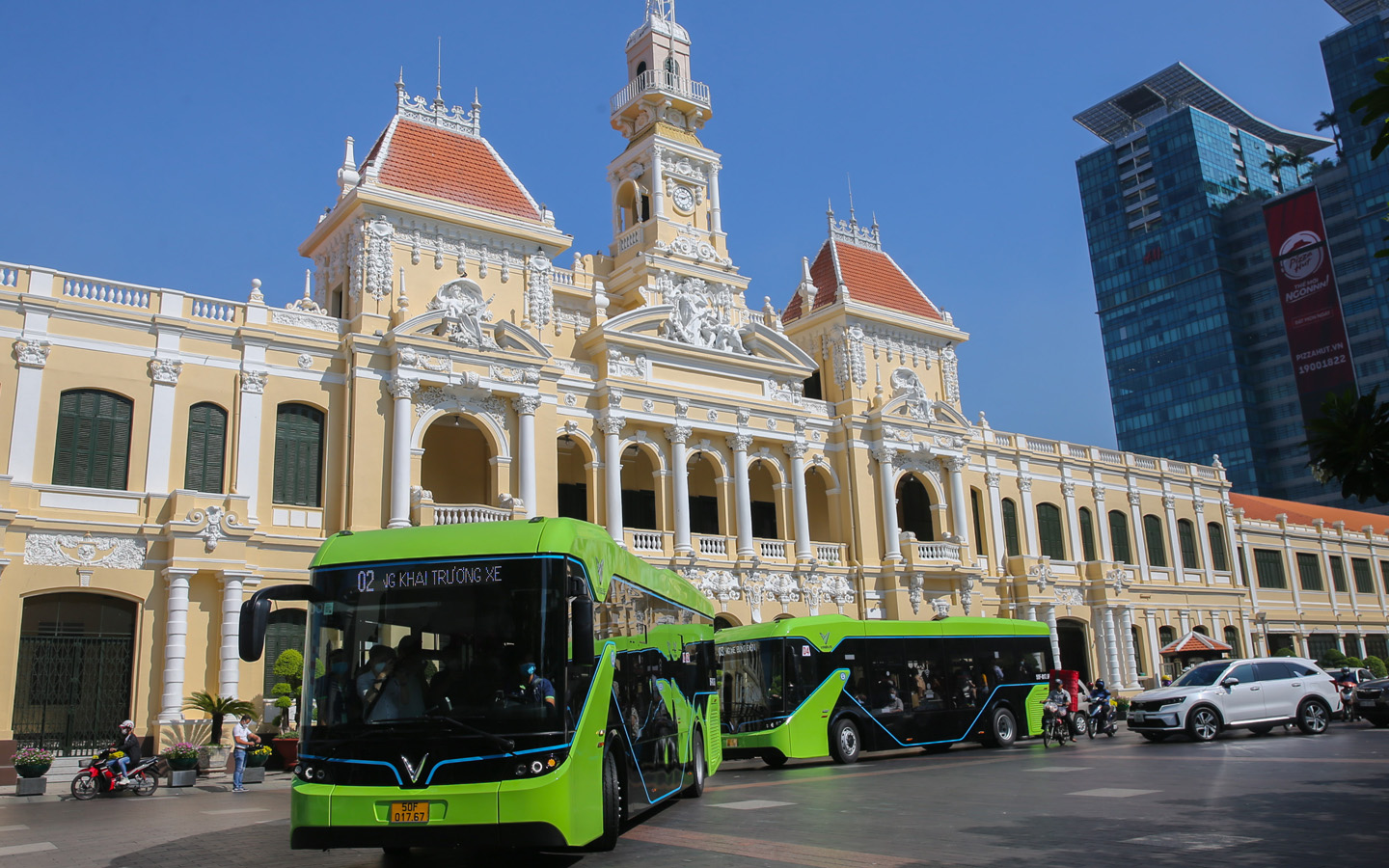E-buses Drive Lower Emissions
E-buses (short for electric buses) are now plying the roads of Viet Nam and providing an environment-friendly and sustainable transport solution. ADB worked with development finance and blended finance partners to support the growth of the electric transport industry and help reduce greenhouse gas emissions and local air pollution in the country.
E-buses on the Rise
Motorcycles dominate the roads of Viet Nam and are big contributors to road congestion and air pollution. Viet Nam’s transport sector accounts for 18% of the country’s annual greenhouse gas emissions.
In the 2000s, the number of registered motorized vehicles in Viet Nam increased markedly, with high annual growth rates of 17.8% for motorcycles and 7.0% for cars. By 2020, the country had 58 million motorcycles in circulation for a population of 96 million people, which implies more than two motorcycles per family, on average. Cars registered in the same year reached 3.6 million, or less than four cars per 100 people.
In most cities in Viet Nam, bus networks are the most common mode of public transport. Ho Chi Minh City, for instance, has 2,300 buses, while Ha Noi has about 2,000. However, the use of public buses is low. Bus networks meet only about 9% of transport demand in Ho Chi Minh and 12%–15% in Ha Noi.
New e-buses are helping reduce traffic congestion, air pollution, and greenhouse gas emissions in Viet Nam’s cities.
Climate Finance for Green Transport
In 2022, ADB mobilized a financing package for VinFast Trading and Production Joint Stock Company (VinFast) for the Viet Nam: VinFast Electric Mobility Green Loan Project](https://www.adb.org/projects/55327-001/main). The project supports VinFast’s investment into e-buses used for the first public transport e-bus fleet in Viet Nam and the country’s first national e-vehicle charging network.
The ADB VinFast project's $135 million climate financing supports VinFast with the acceleration of electric mobility in Viet Nam, helping the country on its path to net zero by 2050.
Tristan Knowles investment specialist and project leader, ADB
As the lead arranger of this $135 million climate loan, ADB catalyzed cofinancing from development finance institutions and blended concessional finance. Development finance partners included Export Finance Australia, the Finnish Fund for Industrial Cooperation, Oesterreichische Entwicklungsbank AG, and ResponsAbility. Blended concessional financing was provided by the Australian Climate Finance Partnership (ACFP), the Clean Technology Fund (CTF), and the Climate Innovation and Development Fund (CIDF).
The ACFP is a concessional financing facility managed by ADB and funded by the Australian Department of Foreign Affairs and Trade. The CTF is one of two trust funds under the Climate Investment Funds, a global funding initiative focused on climate finance. The CIDF is an ADB-managed concessional financing fund with grant commitments from Bloomberg Philanthropies and Goldman Sachs.
The climate financing is certified by the Climate Bonds Initiative, a scientifically based standard for labeling bonds, loans, and other debt instruments that contribute to addressing climate change.
The ACFP and the CTF are also providing financing for a related program on Mainstreaming Electric Vehicles to Reduce Greenhouse Gas Emissions. The program is helping raise consumer awareness about electric vehicles and promoting science, technology, engineering, and mathematics among women. ADB is also coordinating with VinFast to assess the impacts of Viet Nam’s transition to electric vehicles in economic, social, environmental, and infrastructure terms.
VinFast is Viet Nam’s first domestic car company and e-vehicle manufacturer that develops its own cars for the domestic and international market, rather than assembling foreign-brand cars. Established in 2017, the company is a subsidiary of Vingroup Joint Stock Company, Viet Nam’s largest private enterprise in Viet Nam.
“The ADB VinFast project’s $135 million climate financing supports VinFast with the acceleration of electric mobility in Viet Nam, helping the country on its path to net zero by 2050,” Tristan Knowles, ADB investment specialist and project leader, said.
E-vehicles for the Future
The VinFast project introduced the first e-bus fleet in Viet Nam and the first national e-vehicle charging network. The project promotes e-vehicles as a major mode of public transportation and supports the development of the industry and related infrastructure.
Specifically, the project supported VinFast investments in manufacturing e-buses and charging stations. VinFast now operates e-buses for public transport in various cities in Viet Nam, starting with Ha Noi, Ho Chi Minh City, and Phu Quoc.
“The VinFast project is promoting the wide use of energy-efficient and eco-friendly e-buses in Viet Nam, while also helping the country fulfill its commitments to the Paris Agreement on Climate Change,” Knowles said.
In the long run, the VinFast project will contribute to Viet Nam’s efforts to achieve net-zero greenhouse gas emissions and expand high-tech manufacturing industries.
Project Details
Viet Nam: VinFast Electric Mobility Green Loan Project
Cost
$135 million
- ADB Resources $20 million
Cofinancing Partners
- Australian Climate Finance Partnership (Loan) $20 million
- Climate Innovation and Development Fund (Grant) $3 million
- Clean Technology Fund (Loan) $5 million
- Export Finance Australia (Loan) $30 million
- Finnish Fund for Industrial Cooperation (Loan) $15 million
- Oesterreichische Entwicklungsbank AG (Loan) $25 million
- ResponsAbility (Loan) $17 million
Dates
Approval Date 25 August 2022
Signing Date Undisclosed
Completion Date Undisclosed


